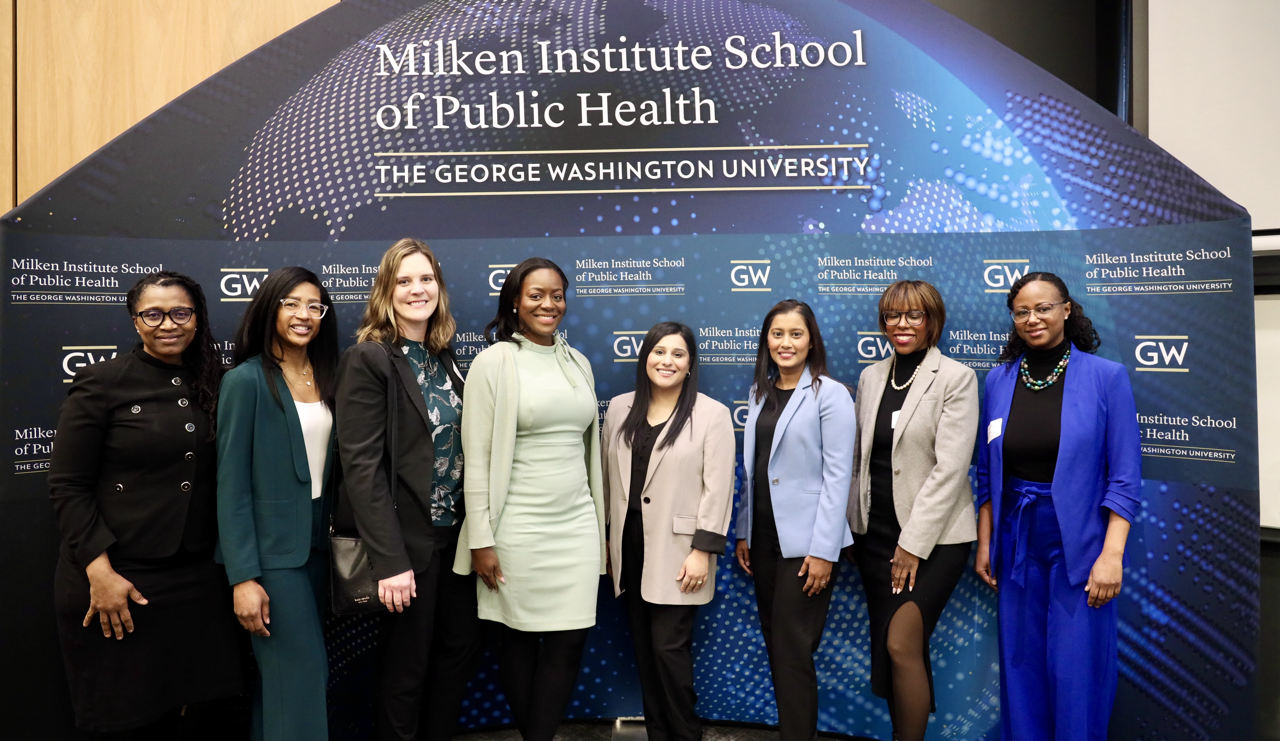WASHINGTON (February 5, 2025) - The Milken Institute School of Public Health’s Department of Health Policy & Management, in partnership with the National Capital Healthcare Executives (NCHE), hosted the 34th Annual Gibbs Oration and 18th Annual Coile Lecture last month. This event brought together national healthcare leaders, GW alumni, students, faculty, and NCHE members to engage in meaningful discussions about the state of healthcare and its future.
The Gibbs Oration and Coile Lecture were established to honor the legacies of two visionary leaders of both our program and the healthcare industry: Frederick H. Gibbs, founder and first chair of GW’s Department of Health Care Administration in 1958, and Russell C. Coile Jr, a healthcare futurist lauded for his insights into industry trends and developments. Their contributions to healthcare administration and innovation continue to inspire the field.
Generous philanthropic support from alumni, faculty, and friends helped sustain these lectures, ensuring that the impact of their work would resonate for generations. This year’s Gibbs Oration was presented by Mr. and Mrs. Steven Summer.
The event opened with the American College of Healthcare Executives (ACHE) panel, Managing for Morale: Effective Management Techniques to Retain Your Staff. Moderated by Dr. Leonard Friedman, professor and director of the MHA@GW program, the discussion featured Deneen Richmond, MHA ’92, president of Luminis Health Doctors Community Medical Center, and Tanya Alteras, director of research and innovation at America’s Essential Hospitals. The panel explored strategies for improving workplace morale, fostering employee retention, and navigating leadership challenges in healthcare.
Following the panel, Barbara Joers, president and CEO of Gillette Children’s gave the keynote Gibbs Oration, offering a front-line perspective on the intersection of people, policy and politics in healthcare. A Milken Institute School of Public Health Masters in Health Administration (MHA) ‘96 Alumna, she has also chaired the board of directors for the Children’s Miracle Network Hospitals and been an active voice in the American Hospital Association.
Drawing from more than 25 years of experience and her own journey as a former pediatric patient, Joers emphasized the ethical responsibility of healthcare leaders. “You need to be the moral guide, lead beside others,” she stated in her talk, echoing lessons from her time at GW and referencing Professor Kurt Darr’s work on ethical dilemmas in decision-making. She underscored the critical role of Medicaid in narrowing health disparities, noting that nearly half of all Medicaid enrollees are children.
“Take Medicaid away, and more than half the children in America won’t get what they need,” she warned. Joers urged healthcare leaders to be intentional, accountable, and engaged in advocacy, reminding the audience that policy is not just political—it directly impacts lives saying, “Every human is different and every single body is different. Ask questions, don’t make assumptions.”
The event ended with the Coile Lectureship, “Redefining Health Care: Trends Shaping Tomorrow,” delivered by Dr. Kenneth Abrams, Chief Medical Officer and Managing Director at Deloitte Consulting.
Challenging the audience to rethink the future of healthcare, he emphasized that the U.S. does not have a true healthcare system, but rather an “illness and injury system… we are not generating and promoting health.” Comparing global rankings, he highlighted how the U.S. spends more on healthcare yet experiences poorer outcomes, attributing the disparity to administrative costs, drug pricing, and inefficiencies. Dr. Abrams argued that systemic change is already underway, driven by digital transformation, workforce challenges, and an empowered consumer base.
“If we are to change the future of health, we have to move to a system designed to support health in this country,” he said. He urged leaders to prioritize social reform, invest in preventive care, and recognize that "the center of health in the US is shifting toward the promotion of health and well-being and health restoration.”


